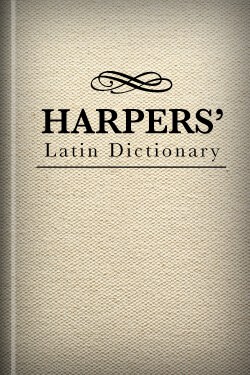We pay a lot of attention to the Bible’s original Greek, Hebrew, and Aramaic, but many of the early church’s most important texts were written in another language: Latin. Luckily, Logos offers some outstanding Latin reference works and primary sources that can bring you closer to the ancient world.
Let’s start exploring:
Get the best Latin dictionary
Choosing scholarly resources can come down to preference—we all have our favorite authors, our favorite exegetical methods, our favorite reference works. But sometimes there’s no room for debate: sometimes one resource is clearly the standard in its field.
Lewis and Short’s Latin Dictionary is that resource. For those of us who’re fascinated by the ancient world, it’s simply the finest Latin dictionary available.
Scholars choose Lewis and Short because of its breadth. It gives you 2,019 pages’ worth of lexical data, spanning classical times through the early modern era; that makes it an important aid whether you’re working through Irenaeus or through Aquinas. If you’re studying Christian history, you’ll be working with Latin. If you’re working with Latin, you’ll want this dictionary.
Moreover, it’s in the Logos edition that Lewis and Short really shines. Those 2,019 pages can be hard to navigate in print, to say nothing of the legwork involved in cross-referencing them against the patristic hard copies (if you can even access any). With Logos,* everything is indexed for precise searches, and you can jump right from an entry to a primary source and vice versa. It’s that mixture of scholarly rigor and right-now usefulness that’s earned Lewis and Short such glowing reviews: other Logos users write that “[t]his is THE Latin dictionary,” that it’s “easily the best Latin dictionary ever made,” that it’s “stellar,” that “no hard copy can even begin to compete with what we can do with a Logos dictionary.”
Then choose from these important primary sources:
1. Early Church Fathers
Augustine, Irenaeus, Clement of Alexandria, Tertullian, Eusebius, Origen—this massive collection sets you up with English translations of the postapostolic era’s most important works. It’s a window into the origins of a great deal of Christian doctrine, which makes it a fascinating way to revisit the foundations of your faith. Pick up the Early Church Fathers collection and explore the early church’s world.
2. The Works of Prudentius
The poems of Prudentius, who was educated in religion, literature, and rhetoric, are shot through with biblical influence. His most important work is the Psychomachia, which is considered the first major Christian allegory; that means it paved the way for classics like the Divine Comedy and The Pilgrim’s Progress. You’re already studying the early church’s theologians. Now, study its poetry with the four-volume Works of Prudentius.
 3. Works of Ovid and Horace
3. Works of Ovid and Horace
Latin literature’s three canonical poets are Virgil, Ovid, and Horace. Though they weren’t Christian writers, it’s important to know their work, which was hugely influential in the ancient world. You can get Virgil’s Aeneid in the famous Harvard Classics Collection; Ovid and Horace you can get in the incredibly rich Works of Ovid and Horace. (The standout volume is Ovid’s Metamorphoses, one of the most influential poems in literary history.) Take a look at Ovid’s and Horace’s collected works.
4. Lucretius’ On the Nature of Things
In Acts 17:18, Paul addresses Epicurean and Stoic philosophers. If you’re curious about Paul’s context, you’ll want to look into Epicureanism, one of the most popular worldviews in early Christian times; the best way to do so is through the writings of Lucretius. (Epicurus’ magnum opus, On Nature, was destroyed, but Lucretius’ On the Nature of Things builds on Epicurus’ thought.)
Pick up Lewis and Short today, and then choose the primary sources that fit your study!






